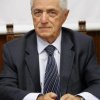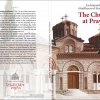5. "The Beginning of Sorrows" (Matt. 24:8)
In 1908 Archbishop Platon (Rozhdestvensky) replaced St. Tikhon as the archbishop of the American archdiocese. Fr. Sebastian hoped that the new archbishop would offer the same support to the Serbian Orthodox Mission as had his predecessor. In September of 1908, he wrote to Archbishop Platon, outlining the needs of the Serbian congregations in America:
"Last Easter in three churches there were no services, a fourth was closed, and many colonies with a fairly dense Orthodox population did not even hear 'Christ is Risen.' It is impossible to obtain priests anywhere, and in most cases people cannot give enough to support a priest properly. Now they have promised me in Belgrade that at the next Assembly of Bishops they will raise the question of allocating two scholarships for the Mission, so that two Serbian lads from America may be educated at a seminary in Serbia. But this presents other problems: finding the money to send these lads to Europe.
Serbian archpastors in the Old Country with brotherly love expect Your Eminence to organize our part of the Church. The Lord's blessing will doubtless be given to a continuation of the work begun with wisdom, after six years of responsibility, by His Eminence Tikhon, now Archpastor of Yaroslavl."[85]
During the same year, Fr. Sebastian, while retaining his position as head of the Serbian OrthodoxMission, served at the Holy Transfiguration Church in Denver, Colorado, a parish that had been received into the Orthodox Church from Uniatism in 1904. The parish consisted primarily of Russians and Serbs. In September of 1908, Fr. Sebastian wrote to Archbishop Platon: "Here the church is fairly large, there is enough land, the debt is small.... Many children. They want a psalm-reader and teacher, who can direct a choir.... Come, Your Eminence, to Denver."[86]
Since the Cathedral of St. Basil in Fr. Sebastian's native city of San Francisco had been destroyed in the great earthquake of 1906, a new cathedral, dedicated to the Holy Trinity and located at Green and Van Ness, had been built. In July of 1909 Archimandrite Sebastian traveled to San Francisco in order to consecrate the new cathedral.
In the meantime, Fr. Sebastian was experiencing a growing sense of futility as the head of the Serbian Orthodox Mission. Many Serbs in America had made it clear to him that they did not wish to support or be united under the Serbian Orthodox Mission because it was within the jurisdiction of the Russian Church. Some Serbs were even unfavorable toward Fr. Sebastian because he was under the Russian Church and had placed Serbian congregations in America under that Church.[87] Calling the Serbian OrthodoxMission "a totally Russophile agency,"[88] they accused Fr. Sebastian himself of being a "Russophile."[89]
In reality, Fr. Sebastian, as a selfless servant of Christ in His Church, cared first of all for the spiritual well-being and salvation of Christ's flock. He followed the words of His Master: Feed my sheep (John 21:16–17). Like St. Tikhon, Fr. Sebastian knew that, for the Serbian flock in America to be fed properly, they needed a Serbian archpastor and Serbian priests who spoke their language and understood their needs. This was the reason behind his attempt, at St. Tikhon's behest, to organize the Serbian Orthodox Mission and to have a Serbian bishop consecrated for America. Fr. Sebastian was also completely open to the possibility of Serbian congregations in America being placed under the Serbian Church; however, as we have seen, at that time the Serbian Church was not yet ready to take full responsibility for priests and parishes in America. As far as Fr. Sebastian was concerned, the most pressing question was not what Local Orthodox Church—Russian or Serbian—the Serbs in America would be under (as long as they were under a canonical hierarchy), but rather how their spiritual needs would be met, how they would be nourished by the life and grace of the Church.
Fr. Sebastian was greatly saddened that, at the end of the first decade of the twentieth century, the needs of the Serbs were not being met properly. For the nineteen chartered Serbian parishes in America (not to mention the smaller Serbian Orthodox communities), there were only eleven canonical priests. Non-canonical priests from Serbia took advantage of this situation, roaming the United States and performing services in Serbian communities without the blessing of any bishop. With no Serbian bishop assigned to America, and with many Serbs not wanting to be in the jurisdiction of the Russian Church, there was little Fr. Sebastian could do to stop this non-canonical activity.[90] He was placed in the unenviable position of having to defend the canonical authority of the Russian hierarchy over American Serbs (because that was indeed the canonical authority at the time) despite the fact that many Serbs resented this authority, and despite the fact that he himself knew that the Serbian churches in America were at an impasse without their own bishop.
Seeing that some Serbian priests and congregations were avoiding him because of his connection with the Russian Church, and finding that the Serbian Orthodox Mission was then (as he said) "left without resources, aid and, what is more, goodwill,"[91] at the end of 1909 Fr. Sebastian asked Archbishop Platon to relieve him of his duties as administrator of the Mission. At the same time he wrote a letter to the Holy Synod of Bishops in Serbia, informing them of the situation of the Serbian Orthodox churches in America and asking for their aid:
"Most Serbs have said that they do not want any other jurisdiction, not even Russian, but their own Serbian Church jurisdiction. On this day I am submitting to North American Archbishop Platon my resignation as administrator of the Serbian Mission, for I am exhausted from the effort and cannot oppose a multitude single-handed.... Once again I caution the Holy Synod that the Serbian Church in glorious, vast America has been left without an administrator and I urge that a Serbian archpastor be sent."[92]
Archbishop Platon reported to theHoly Synod of Bishops in Russia about Fr. Sebastian's request to resign. When the bishops in Russia sent back a Decision to Archbishop Platon granting Fr. Sebastian's request, they felt it necessary to recount the praise that St.Tikhon had given eight years earlier for Fr. Sebastian's accomplishments in America:
"Concerning the Hieromonk Sebastian, His Grace Tikhon of the Aleutians, in his communication to the Holy Synod of June 2, 1902, no. 74, wrote that the appointed Hieromonk, during his service in the Mission, exerted considerable efforts towards 1) building holy churches in America (the construction of churches in Jackson and Seattle, and the decoration of the cathedral church in San Francisco), 2) organizing church-parish life in Minneapolis shortly after the parishioners joined the Orthodox Church, 3) raising religious and national consciousness among Slavs scattered across America, 4) acquainting non-Slav Christians (primarily Episcopalians) in America with the teachings of the Orthodox Church, for which purpose he wrote and published, from his meager resources, several books in English, and 5) translating official documents of the Administration into English."[93]
---
[85] Archives of the American Orthodox Church, no. 1129, July 23, 1908. Quoted in Bishop Sava, p. 216.
[86] Fr. Sebastian Dabovich to Archbishop Platon. Written in Denver, Colorado, September 29, 1908. Quoted in Bishop Sava, p. 278.
[87] Bishop Sava, pp. 34, 40.
[88] Serbian Church-School Congregation in Steelton, Pennsylvania, to Serbian Patriarch Georgije, October 19, 1905. Quoted in Bishop Sava, p. 30.
[89] Holy Resurrection Serbian Orthodox Cathedral, 1905–2005, p. 51.
[90] Bishop Sava, pp. 35, 42, 176–77.
[91] Fr. Sebastian Dabovich to Archbishop Platon. Written in Oakland, California, December 6, 1909. Quoted in Bishop Sava, pp. 34–35.
[92] Fr. Sebastian Dabovich to the Holy Hierarchical Synod, Karlovci Patriarchate. Written in Oakland, California, December 14, 1909. Quoted in Bishop Sava, p. 35.
[93] Decision no. 4822 of June 22, 1910, Archives of the Synod of the Russian Orthodox Church. Quoted in Bishop Sava, p. 36.




